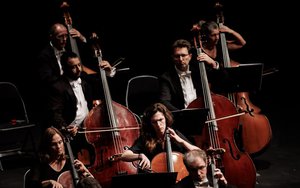- Review by Irwin Hewitt Telegraph - By what miracle did a superb Hungarian orchestra appear last night in a regional concert hall, with a top-rank solo pianist? As an economic proposition the concert was very risky, as the venue was modestly sized and in any case the orchestra does not have the lustrous name that can bring in huge crowds.

Photo: Laszlo Mudra
The answer is that unlike the UK, Hungary is actually proud of its classical music culture, and has a government which though odious in many ways is at least willing to subsidise a tour such as this. That’s something the classical-music lovers of Guildford must be grateful for, as they were treated to something special. It was a generous- sized band, with that unmistakably rich sound that central European orchestras have. It created an extraordinary power which was so much more than simple volume. There was a special unanimity of attack and phrasing, a way of sensitively rounding off a phrase, which was the opposite of regimented. Your eye and ear were constantly drawn to this or that energised violinist or flautist. On the podium was the orchestra’s music director Andras Keller. He’s a violinist by training, and his conducting technique is not exactly elegant to behold. But he has a wonderful ability to vary a speed so subtly that it seems rock-steady, until you become aware that the tempo has relaxed or tightened imperceptibly. That was a boon in the evening’s biggest piece, Beethoven’s Eroica symphony. The first movement began in a way that was spacious yet urgent, and by the time we reached the hectic middle section it felt as if we were in the middle of an insurrection. The funeral march seemed a throwback to the slow, dignified pace orchestras used to adopt, but became lighter and brisker in the major-key section, in a way more like the so-called “period orchestras” of today. Keller is clearly someone who subscribes to no fashions. Mozart’s tragic 40th symphony was naturally more classical and “Grecian” but you could still feel the dramatic flexibility of tempo under the surface. In Bartok’s 3rd piano concerto, we heard another side to this orchestra; a proper Hungarian-folk fire and dash in the finale, and a relish in the mysterious nocturnal rustlings and hootings of the middle movement. The soloist Pierre-Laurent Aimard gave this swan-song of the ailing composer a smiling, genial quality. It missed the tragic, haunted quality of András Schiff’s performance at the Proms some weeks back, but was engaging in its own way. Click HERE for the original article on the website of Telegraph
